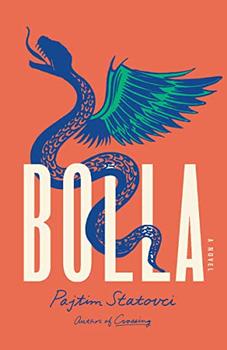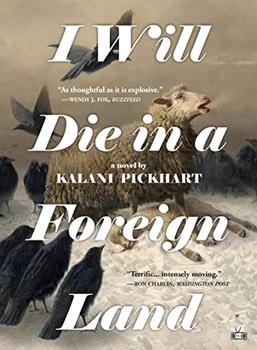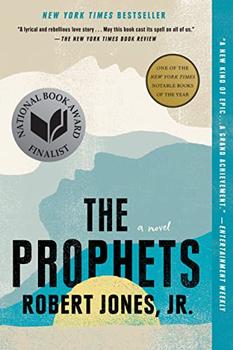Summary | Excerpt | Reviews | Beyond the book | Read-Alikes | Genres & Themes | Author Bio

Bolla opens in Kosovo in 1995 and spans the years leading up to the Kosovo War of 1998-1999 and the years following. The story opens with a passionate affair between Arsim and Milos, two men in their 20s who fall quickly in love. Their relationship is conducted in secret: not only is Arsim a married man and soon-to-be father, both are hiding their sexuality for fear of persecution. Complicating matters further, their respective Albanian and Serbian ethnicities make being seen together – let alone being romantically involved – a dangerous move. Living in the Kosovo border region between the two nations, tension has been building for decades as a result of geographical, political and religious disputes. The outbreak of war, in which Albanian resistance fighters make a bid for independence from growing Serbian control, will force the two to part ways abruptly. Though they will strive to find each other again once the dust begins to settle, neither will quite be the man he once was.
 Though the story plays out against a backdrop of war, the conflict itself is only ever addressed in fleeting references. Instead, Statovci chooses to focus on the persistence of personal struggles and the human cost of battle, particularly the issues of displacement and trauma. Indeed, one of the novel's greatest strengths is the complexity of its characters. Though both men are capable of much tenderness and generosity when together, Statovci is not afraid to show their darker sides. The constant pressure and resentment of hiding his true feelings from the world can drive Arsim to be violent and cruel – particularly where his wife is concerned – while Milos, once a gentle soul determined to become a doctor, is left a shell of his former self by the horrors he endures as a soldier on the frontline. It's a testament to the subtlety and realism of Statovci's style that despite the characters' undeniable flaws and inexcusable actions, we still find ourselves rooting for them to ultimately find happiness.
Though the story plays out against a backdrop of war, the conflict itself is only ever addressed in fleeting references. Instead, Statovci chooses to focus on the persistence of personal struggles and the human cost of battle, particularly the issues of displacement and trauma. Indeed, one of the novel's greatest strengths is the complexity of its characters. Though both men are capable of much tenderness and generosity when together, Statovci is not afraid to show their darker sides. The constant pressure and resentment of hiding his true feelings from the world can drive Arsim to be violent and cruel – particularly where his wife is concerned – while Milos, once a gentle soul determined to become a doctor, is left a shell of his former self by the horrors he endures as a soldier on the frontline. It's a testament to the subtlety and realism of Statovci's style that despite the characters' undeniable flaws and inexcusable actions, we still find ourselves rooting for them to ultimately find happiness.
Running parallel to the core narrative, we are given excerpts of a story by aspiring writer Arsim featuring his reimagined version of the Bolla, a reviled serpent in Albanian folklore (see Beyond the Book). At the surface level, these sections offer a further glimpse into the country's cultural history, but they also offer shrewd commentary on the role that storytelling plays in processing the trials of our own lives.
The prose itself is gorgeous throughout; full of rich metaphors and seamlessly translated into English by David Hackston. It brings the setting to life, capturing the passion of the protagonists and immersing the reader in their story. The book does lean into some well-worn tropes and stereotypes of gay narratives (particularly concerning doomed love affairs and childhood abuse), but the insight into an often-overlooked period of recent history, and the unique delivery, overshadow any initial feelings of familiarity.
Wrenching and relentless in its look at the many forms of heartache and destruction, Bolla is a powerful offering that refuses to soften the blow with infallible heroes or a happily-ever-after. Though this will make it hard going for readers who crave a greater sense of hope, it results in a poignant ode to those kept apart by the stranglehold of society, time and circumstance.
Modern day map of The Balkans. Macedonia should be correctly labelled The Republic of North Macedonia, after reaching an agreement with Greece in 2019 to rename itself so as to distinguish it from the Greek region of Macedonia.
![]() This review was originally published in The BookBrowse Review in August 2021, and has been updated for the
August 2022 edition.
Click here to go to this issue.
This review was originally published in The BookBrowse Review in August 2021, and has been updated for the
August 2022 edition.
Click here to go to this issue.

If you liked Bolla, try these:

by Kalani Pickhart
Published 2022
Set in Ukraine in 2013, I Will Die in a Foreign Land is an especially moving story of quiet beauty and love in a time of terror; an ambitious, intimate, and haunting portrait of human perseverance and empathy.

by Robert Jones Jr.
Published 2022
A singular and stunning debut novel about the forbidden union between two enslaved young men on a Deep South plantation, the refuge they find in each other, and a betrayal that threatens their existence.
I am what the librarians have made me with a little assistance from a professor of Greek and a few poets
Click Here to find out who said this, as well as discovering other famous literary quotes!
Your guide toexceptional books
BookBrowse seeks out and recommends the best in contemporary fiction and nonfiction—books that not only engage and entertain but also deepen our understanding of ourselves and the world around us.